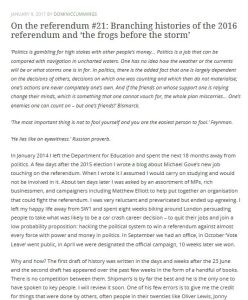Join getAbstract to access the summary!

Join getAbstract to access the summary!
Dominic Cummings
On the Referendum #21
Branching Histories of the 2016 Referendum and “The Frogs Before the Storm”
Dominic Cummings's Blog, 2017
What's inside?
Political consultant shares an insider’s view of the Vote Leave campaign’s stunning Brexit victory.
Recommendation
The Brexit vote was the first 2016 political upheaval, followed months later by Donald Trump’s surprise win. Both elections elicited hand wringing from establishment types, who didn’t see the upsets coming. The results led to a glut of populist gloating that the outcome was obvious. In this inside view of the Brexit vote, Dominic Cummings, architect of Vote Leave, acknowledges that his side easily could have lost. The vote hinged on a few minor mistakes by Britain’s political establishment and on Vote Leave’s lucky breaks. To his credit, Cummings doesn’t make this report a victory lap full of I-told-you-so’s. Instead, he admits that if the opposition had been a little less smug, disorganized and out of touch with the working-class voter, Brexit would have lost as expected. With Brexit and Trump, populism won despite old-guard opposition and mainstream media skepticism. With both, swing voters were crucial. No matter how you see Cummings’ political views, you’ll find him shrewd at reading working-class voters. As he compellingly argues, UK swing voters don’t fit neatly into a single party’s platform. Contrary to the carefully categorized positions the political establishment packages and prefers, swing voters pick and choose positions from both sides. Their omnivorous ideological mix simply seems foreign to those deeply embedded in ordinary partisanship. Across the pond, swing voters in America’s equally unpredictable Rust Belt delivered the White House to Trump. One warning about Cummings’ long blog entry: If you’re not versed in Brexit’s details, you could be perplexed. He writes or blogs in stream-of-consciousness style referring to names and numbers he doesn’t fully explain.
Summary
About the Author
Dominic Cummings, main advisor to Conservative politician Michael Gove from September 2007 to January 2014, runs the management and political consulting firm North Wood.
















Comment on this summary